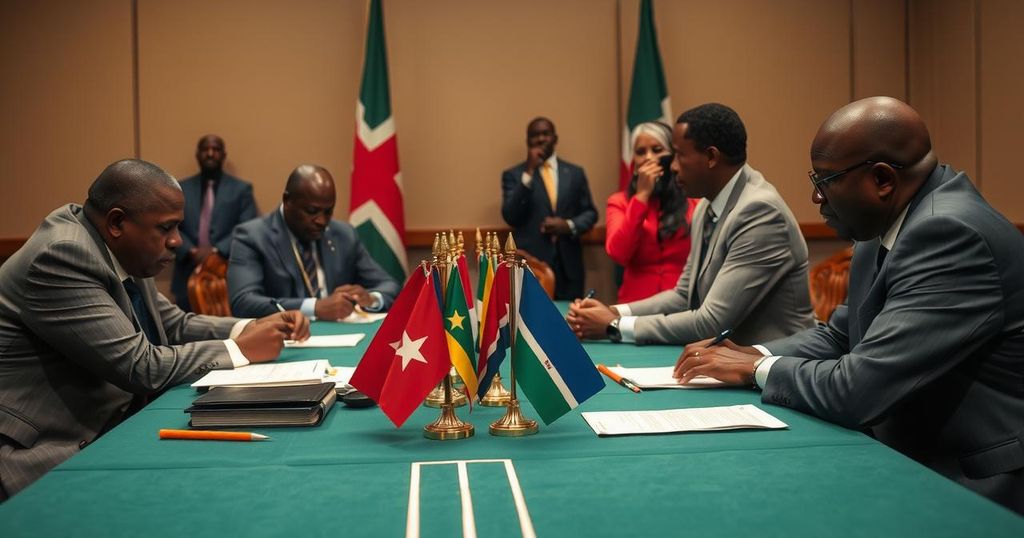Peace talks in South Sudan have recommenced after four months, focusing on unaddressed issues post-2018 agreement. Held in Kenya, the discussions include a newly appointed governmental delegation. Challenges such as postponed elections and a controversial detention law remain central to negotiations. Key leaders stress the importance of adhering to existing agreements for the sake of national stability.
The peace negotiations in South Sudan have resumed after a four-month hiatus, spurred by a shift in the government’s delegation. Hosted in Nairobi, Kenya, these discussions aim to address the ongoing conflict that has significantly hindered the country’s economic development. This recent round, known as Tumaini (meaning hope in Swahili), includes dialogues between the South Sudanese government and opposition factions not part of the 2018 peace agreement that ended a devastating civil war, which resulted in over 400,000 casualties.
The peace talks had stalled following President Salva Kiir’s dismissal of the previous delegation, thereby delaying the new team’s travel to the negotiation venue. Although the government has refrained from disclosing reasons for these changes, President Kiir emphasized that the purpose of these talks was not to replace the 2018 peace accord but to integrate the concerns of the holdout groups. For now, full implementation of that agreement remains pending.
In a related context, South Sudan recently postponed its elections originally scheduled for December 2024, moving them to 2026, due to challenges with voter registration driven by financial constraints. This is occurring amidst an ongoing economic crisis, where public servants have reportedly gone unpaid for over a year, heavily impacting national productivity and morale.
The negotiations thus far have indicated mutual discontent, particularly concerning a controversial new law allowing detentions without warrants, which both sides have criticized as a violation of human rights. On the renewed opening day of talks, chief mediator Lazarus Sumbeiyo urged all delegates to work diligently to resolve outstanding issues.
Pagan Amum of the South Sudan Opposition Movement Alliance stressed the importance of honoring previously reached agreements, highlighting the urgency of preserving national stability. “This is not a time to renegotiate what we have already agreed upon,” Amum stated. Similarly, Kuol Manyang Juuk, representing the government, appealed for unity, reminding delegates that this was an opportunity to build upon past accomplishments, rather than restarting negotiations from the beginning.
The backdrop of the peace talks in South Sudan is deeply intertwined with the country’s protracted civil conflict, which led to immense loss of life and displacement. The previous peace deal in 2018 aimed to cease hostilities but has seen insufficient implementation, prompting the need for renewed discussions. Currently, South Sudan faces significant economic challenges, exacerbated by delayed elections and a dysfunctional employment sector. The international community remains attentive to these negotiations, recognizing their critical role in laying a foundation for peace and governance in South Sudan.
In conclusion, the resumed peace talks in South Sudan represent a crucial opportunity to address long-standing issues and achieve lasting stability in the nation. The commitment from both the government and opposition to engage in meaningful dialogue is essential to ensure that past agreements are honored and that the country does not regress into further chaos. The outcome of these negotiations will have a profound impact on the future governance and economic recovery of South Sudan.
Original Source: apnews.com






